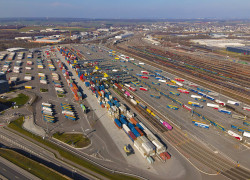Enovos publishes Trendwatch 2020
Implementation of the energy change policy slower than anticipated.
Survey of experts on the turnaround in energy policy: Renewable energies will be utilised even more in future:
- 95 % of experts are in favour of developing wind power.
- 83 % are of the opinion that the measures for the turnaround in energy policy introduced by their government are not sufficient.
- 55 % of experts anticipate the comprehensive availability of smart grids by 2030; 75 % anticipate this for smart meters.
- 82 % of experts forecast 30 % less energy consumption in existing functional buildings by 2030 on account of energetic refurbishment measures.
- 72 % of experts anticipate that a fifth of all private households will have become remotecontrolled smart homes by 2030.
- 65 % of experts think that energy suppliers will adopt a key role in the distribution of electric vehicles.
- 75 % are believe that an entirely new battery technology will have asserted itself by 2030.
These are the most important results of the ENOVOS TRENDWATCH 2020 future study commissioned by the Enovos Group and presented today by Dr. Sabine Graumann, TNS Infratest Business Intelligence, to Etienne Schneider, Minister for the Economy and External Trade in Luxembourg. For this future study, TNS carried out 375 interviews in autumn 2012 with experts in Luxembourg, Germany, France and Belgium on the future of the energy sector.
Renewable energies as a pillar of energy supply
Experts opine that energy supplies will undergo radical change over the next twenty years and experts in each of these countries agree that renewable energies will be utilised even more in future. 95 % of experts are in favour of developing wind power, 81 % would prefer geothermal energy and 76 % envisage increased use of photovoltaic in the next twenty years. 42 % of those surveyed regard natural gas as the only fossil fuel which will be developed over the next twenty years. 37 % of experts are in favour of abandoning nuclear energy. But in France, 61 % of those specialists surveyed favour continued development of nuclear power.
Economic opportunities for the energy sector and new players on account of new fields of business
Energy suppliers are planning to adopt the roles of “production manager”, “virtual supplier” and “efficiency partner”, and offer their customers consulting services. Half of the experts surveyed believe that these services will account for ten per cent of revenues by 2020. Six out of ten experts anticipate that telecommunications companies will handle invoicing (which is increasingly more complex) for energy suppliers by 2030. A breakthrough on the energy market by players from outside the industry, e.g. by Rewe, Google or Amazon, is also regarded as likely by 2030.
Political measures for implementing the energy change policy are insufficient
80 % of all experts are of the opinion that the measures for the energy turnaround introduced by their governments are not sufficient. 80 % of experts regard tax incentives and 70 % regard strict statutory guidelines as inevitable for realising the turnaround in energy policy. “The aim is to continue to drive the development of renewable energies in order to reduce dependence on energy imports over the long term while taking consideration of the economic costs and developing new branches of industry leading to the creation of new jobs”, claims Etienne Schneider, Minister for the Economy and External Trade in Luxembourg.
Private end consumers pay
62 % of all experts surveyed are convinced that the private end consumer and not the major industrial customers and companies will foot the bill for the turnaround in energy policy. Only 27 % of those experts surveyed believe that the end consumer is willing to pay considerably more for verifiably “green products” and energy services. 86 % of those surveyed estimate that price and convenience are the decisive factors for purchase decisions in the energy sector.
Slow but steady development of smart grids
In an energy system with a high proportion of renewable energies, the development of smart grids is absolutely vital. But this process is only evolving slowly. 55 % of experts anticipate the comprehensive availability of smart grids by 2030 while 34 % think it will take longer. Problems with acceptance on the part of the public, for example, and high investment costs are the most important reasons why expansion is not progressing as fast as planned.
The development of smart grids will be accompanied by the introduction of electronic meters, so-called smart meters, in private households. 75 % of experts anticipate that smart meters will be deployed in more than 90 % of private households by 2030. More than half of the French and Luxembourgian experts believe that this threshold will in fact be exceeded by 2020 as the old meters are replaced free of charge in their countries. The new functions offered by smart meters are asserting themselves at various speeds among consumers, according to the experts. 61 % think that ten per cent of private households will draw cost advantages from time-dependent electricity rates by 2020. 83 % of experts regard control of private energy consumption via mobile phone as possible by 2030. 44 % believe that this offer will be introduced as early as 2020. Direct load control where electricity suppliers switch off household devices to save energy costs for consumers is something 47 % of those surveyed believe can only be asserted gradually by 2030 or later – not least because not every household will agree to grant remote access to its equipment.
Smart buildings capable of more than energy efficiency / Smart homes combine less energy consumption with more comfort
82 % of experts anticipate that functional buildings such as office buildings will save around 30 % in terms of energy consumption by 2030 thanks to energetic refurbishment measures. This view is held by 89 % of experts in Germany, 85 % in Belgium, 75 % in France and 71 % in Luxembourg.
60 % of experts are also of the opinion that all functional buildings will be automatically controlled by 2030. Automation includes heating, cooling, dehumidification, ventilation, shading and illumination. 20 % assume that comprehensive building automation will already be achieved by 2020. 40 % of experts do not anticipate this until 2030 while 29 % believe it will even be later.
Currently, at most one per cent of new buildings in each of the four countries is likely to be a smart home. 56 % of the German experts, 47 % of those representing Luxembourg, 33 % of the French and 27 % of the Belgian experts regard an increase in the number of new buildings accounted for by smart homes from a current rate of one per cent to 20 % as soon as 2020 as possible. 72 % of all experts think that one in five private households will be a remote-controlled smart home by 2030. 83 % regard automatic location-independent room adaptation to individual profiles as possible by 2030 at the latest.
Age-appropriate assistance systems make a considerable contribution towards enabling older people to live autonomous lives at home. 91 % of German experts, 75 % of those representing France, 74 % of the Belgian and 73 % of the Luxembourgish experts anticipate deployment of these assistance systems in private households by 2030 at the latest. 71 % of experts believe that housing associations will achieve ten per cent of their revenues by 2030 at the latest with social housing management and services taking care of the elderly.
According to 18 % of experts, at least ten per cent of the population will live in a multigeneration house by 2020 with separate apartments for various generations as well as some rooms for common use. 61 % of experts believe that this scenario will come to pass by 2030 at the latest.
Smart mobility – the success of electro-mobility depends on new drive technologies and infrastructures
76 % of all experts interviewed rate the self-commitment by their respective national governments to achieve a certain penetration rate for electric vehicles by 2020 as unrealistic. Only the French, representing 44 %, are optimistic that two million registered electric vehicles could be the reality by 2020 as public facilities are obliged to change over to electric vehicles.
Electric vehicles are only more environmentally friendly than cars with petrol or diesel engines if they are powered by electricity sourced from renewable energies. The experts do not regard this specification as capable of being realised either. A mere 23 % assume that 70 % of electric vehicles will be supplied with electricity from renewable energies by 2020. 30 % anticipate this rate being achieved between 2020 and 2030.
The role of the energy suppliers in the area of electro-mobility should not be underestimated: 65 % of experts are of the opinion that energy suppliers will adopt a key role in the distribution of electric vehicles.
Industry and politics are investing heavily in the development of alternative drive technologies. 75 % of those experts interviewed think that an entirely new battery technology will have asserted itself by 2030. 51 % of experts believe that electric vehicles will be primarily equipped with plug-in hybrid drives by 2020. This is however only a bridging technology. 68 % of experts anticipate that fuel cell technology will be industrially practical by 2030 and available at affordable prices. 99 % of experts regard the high procurement costs, 81 % the low range and limited battery life for the essential obstacles to successful development by electric vehicles on the market.
85 % of experts believe that the infrastructure for electro-mobility comprising charging stations and smart park & ride systems will be established comprehensively in public parking spaces and multi-storey car parks by 2030. 70 % of experts are of the opinion that quick charging stations where charging processes can be reduced to thirty minutes will be universally available by 2030. More than half of the experts interviewed assume that these charging stations will be largely operated by energy supply companies as early as 2020.
53 % of experts assume that the park & ride systems in large cities will be exclusively reserved for electric vehicles by 2030. 72 % of all those interviewed believe that “Mobility on Demand”, i.e. car-sharing with mobile and transparent reservation and billing systems, will have finally asserted itself by 2030.
38 % of experts regard a scrappage scheme for standard vehicles as likely to have established itself by 2030. 64 % regard it as possible that by 2030 the monetary incentives will disappear and electric vehicles will only be rewarded in the form of special parking zones and driving lanes.
Initial results of the survey were presented at the ENOVOS FUTURE SUMM IT on 22 November 2012. The full ENOVOS TRENDWATCH 2020 report can now be downloaded free of charge from www.enovos-future-summit.eu.
Communiqués liés
RSA launches technology and management liability insurance s...
RSA Luxembourg, part of Intact Insurance Specialty Solutions, today announces th...
Lancement d'une nouvelle connexion intermodale entre Bettemb...
CFL multimodal a le plaisir d'annoncer le lancement de sa nouvelle connexion i...
Experts from LUNEX award first micro-credentials in Rwanda o...
The Rwanda Ministry of Education (MINEDUC) formally inaugurated Syllabi, a publi...
ERG Notes that ENRC Secures Landmark Victory as Court of App...
Eurasian Resources Group (ERG), a leading diversified natural resources group he...
LetzToken et La Vie est Belle annoncent leur partenariat ouv...
«?LetzToken?», plateforme de tokenisation pionnière basée à Luxembourg, et ...
ERG announces a Pre-Export Finance Facility Agreement based ...
Eurasian Resources Group (“ERG”, “The Group”), a leading diversified nat...
Il n'y a aucun résultat pour votre recherche







